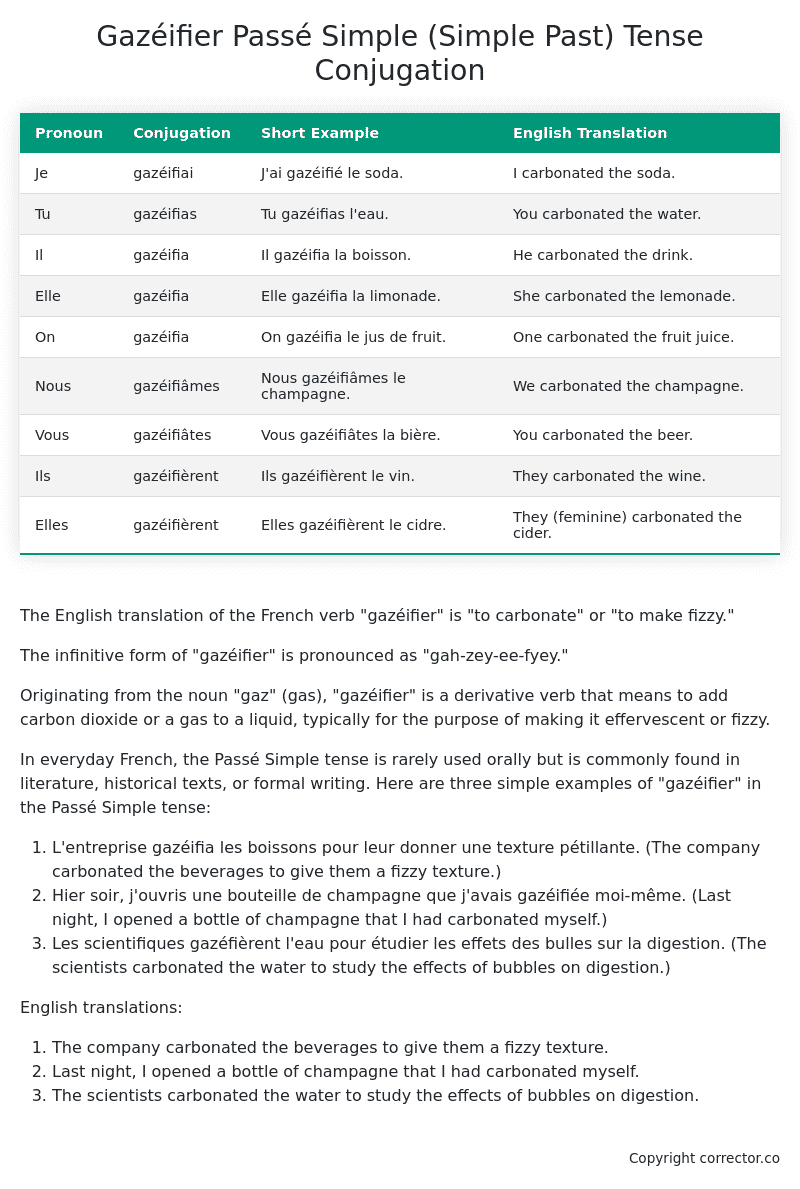Passé Simple (Simple Past) Tense Conjugation of the French Verb gazéifier
Introduction to the verb gazéifier
The English translation of the French verb “gazéifier” is “to carbonate” or “to make fizzy.”
The infinitive form of “gazéifier” is pronounced as “gah-zey-ee-fyey.”
Originating from the noun “gaz” (gas), “gazéifier” is a derivative verb that means to add carbon dioxide or a gas to a liquid, typically for the purpose of making it effervescent or fizzy.
In everyday French, the Passé Simple tense is rarely used orally but is commonly found in literature, historical texts, or formal writing. Here are three simple examples of “gazéifier” in the Passé Simple tense:
- L’entreprise gazéifia les boissons pour leur donner une texture pétillante. (The company carbonated the beverages to give them a fizzy texture.)
- Hier soir, j’ouvris une bouteille de champagne que j’avais gazéifiée moi-même. (Last night, I opened a bottle of champagne that I had carbonated myself.)
- Les scientifiques gazéfièrent l’eau pour étudier les effets des bulles sur la digestion. (The scientists carbonated the water to study the effects of bubbles on digestion.)
English translations:
- The company carbonated the beverages to give them a fizzy texture.
- Last night, I opened a bottle of champagne that I had carbonated myself.
- The scientists carbonated the water to study the effects of bubbles on digestion.
Table of the Passé Simple (Simple Past) Tense Conjugation of gazéifier
| Pronoun | Conjugation | Short Example | English Translation |
|---|---|---|---|
| Je | gazéifiai | J’ai gazéifié le soda. | I carbonated the soda. |
| Tu | gazéifias | Tu gazéifias l’eau. | You carbonated the water. |
| Il | gazéifia | Il gazéifia la boisson. | He carbonated the drink. |
| Elle | gazéifia | Elle gazéifia la limonade. | She carbonated the lemonade. |
| On | gazéifia | On gazéifia le jus de fruit. | One carbonated the fruit juice. |
| Nous | gazéifiâmes | Nous gazéifiâmes le champagne. | We carbonated the champagne. |
| Vous | gazéifiâtes | Vous gazéifiâtes la bière. | You carbonated the beer. |
| Ils | gazéifièrent | Ils gazéifièrent le vin. | They carbonated the wine. |
| Elles | gazéifièrent | Elles gazéifièrent le cidre. | They (feminine) carbonated the cider. |
Other Conjugations for Gazéifier.
Le Present (Present Tense) Conjugation of the French Verb gazéifier
Imparfait (Imperfect) Tense Conjugation of the French Verb gazéifier
Passé Simple (Simple Past) Tense Conjugation of the French Verb gazéifier (You’re reading it right now!)
Passé Composé (Present Perfect) Tense Conjugation of the French Verb gazéifier
Futur Simple (Simple Future) Tense Conjugation of the French Verb gazéifier
Futur Proche (Near Future) Tense Conjugation of the French Verb gazéifier
Plus-que-parfait (Pluperfect) Tense Conjugation of the French Verb gazéifier
Passé Antérieur (Past Anterior) Tense Conjugation of the French Verb gazéifier
Futur Antérieur (Future Anterior) Tense Conjugation of the French Verb gazéifier
Subjonctif Présent (Subjunctive Present) Tense Conjugation of the French Verb gazéifier
Subjonctif Passé (Subjunctive Past) Tense Conjugation of the French Verb gazéifier
Subjonctif Imparfait (Subjunctive Imperfect) Tense Conjugation of the French Verb gazéifier
Subjonctif Plus-que-parfait (Subjunctive Pluperfect) Tense Conjugation of the French Verb gazéifier
Conditionnel Présent (Conditional Present) Tense Conjugation of the French Verb gazéifier
Conditionnel Passé (Conditional Past) Tense Conjugation of the French Verb gazéifier
Conditionnel Passé II (Conditional Past II) Tense Conjugation of the French Verb gazéifier
L’impératif Présent (Imperative Present) Tense Conjugation of the French Verb gazéifier
L’impératif Passé (Imperative Past) Tense Conjugation of the French Verb gazéifier
L’infinitif Présent (Infinitive Present) Tense Conjugation of the French Verb gazéifier
L’infinitif Passé (Infinitive Past) Tense Conjugation of the French Verb gazéifier
Le Participe Présent (Present Participle) Tense Conjugation of the French Verb gazéifier
Le Participe Passé (Past Participle) Tense Conjugation of the French Verb gazéifier
Struggling with French verbs or the language in general? Why not use our free French Grammar Checker – no registration required!
Get a FREE Download Study Sheet of this Conjugation 🔥
Simply right click the image below, click “save image” and get your free reference for the gazéifier Passé Simple tense conjugation!

Gazéifier – About the French Passé Simple (Simple Past) Tense
Formation
Usage
Narration
Historical Context
Interactions with other tenses
Passé Composé
Imparfait
Conditional and Subjunctive
Summary
I hope you enjoyed this article on the verb gazéifier. Still in a learning mood? Check out another TOTALLY random French verb conjugation!


